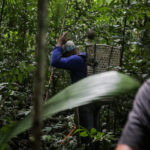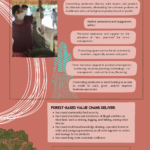Forest Trends’ Biodiversity Initiative works directly with companies, governments, banks, and conservation organizations to help them improve the outcomes for biodiversity from public and private sector development projects.
We offer advisory services to governments on policy development and landscape-level planning for “No Net Loss,” and preferably “Net Positive Impact” on biodiversity, using the Business and Biodiversity Offsets Programme (BBOP) standard and other best practices. We also offer strategic and technical advice to companies with a biodiversity footprint. We work with companies at both the project level and with company-wide identification and management of risk and opportunity related to biodiversity.
Our approach
1) Advising governments
Forest Trends offers policy and technical advice to governments on the application of the mitigation hierarchy (including biodiversity offsets) and environmental assessments, by:
- Supporting the development and implementation of government strategies for No Net Loss or Net Gain (NNL/NG) of biodiversity. These strategies typically cover regulations and policy, technical guidelines, and preparation of public and private sector organizations for their role in the system, whether on the supply or demand side, or as brokers.
- Conducting policy gap analyses tailored to specific countries, provinces and regions, and providing advice on the advantages and disadvantages of different options in order to embed NNL/NG in the policy framework.
- Assisting governments (including Ministries of the Environment, Mining, Energy, Finance, Agriculture, Planning and Justice) in the development and use of a roadmap to achieve Net Gain. The roadmap will show how, over time, to put into place the guidelines, systems, planning, coordination and capacity needed to deliver mitigation and Net Gain in daily land-use planning and decision-making.
- Producing guidelines on core issues in offset design and implementation. Such guidelines include: following the mitigation hierarchy, defining limits to what can be offset, exchange rules and metrics to quantify biodiversity losses and gains, site selection, implementation options, monitoring & evaluation, enforcement and adaptive management.
- Preparing data sets and spatially explicit plans and maps to support NNL/NG planning.
- Capacity building and training of staff responsible for designing and administering biodiversity mitigation systems, land-use planning and permitting.
- Helping governments build the financial resources and technical capacity to implement these systems.
2) Advising the private sector
Forest Trends advises companies in the mining, energy, infrastructure, tourism and forestry sectors on NNL/NG planning, by:
- Assisting companies as they plan for NNL/NG at three stages 1) early assessment of the feasibility of achieving NNL/NG; 2) design and implementation of NNL/NG during and after the preparation of EIAs; and 3) assessment of existing mitigation measures, including offsets, for conformance with standards.
- Providing a roadmap, checklist and common definitions and guidance for companies considering or planning no net loss/net gain biodiversity commitments.
- Developing and administering a ‘Stepwise’ approach for companies to build towards compliance with the mitigation hierarchy and BBOP offset standard.
- Creating tools for company staff and consultants, such as terms of reference for impact assessments and model biodiversity impact mitigation and offset management plans.
- Training company staff and especially the consultants they employ to assess impacts and design and deliver mitigation measures (including biodiversity offsets).
3) Assisting Financial Institutions
Forest Trends works with commercial and development banks and export credit agencies, in:
- Revising and establishing biodiversity policies and safeguards
- Reviewing and giving advice on clients’ projects
- Facilitating dialogue with stakeholders to support national and project-based mitigation
4) Helping the conservation community
Forest Trends undertakes projects for conservation organizations, such as:
- Writing publications, communication tools, and position papers on the mitigation hierarchy, No Net Loss, Net Gain, biodiversity offsets, etc.
- Chairing and facilitating working groups
- Preparing and delivering training materials for organizations to use with their members
Key Results
- Forest Trends co-anchored the Secretariat for the Business and Biodiversity Offsets Programme (BBOP), an international collaboration between companies, financial institutions, governments and civil society organizations working towards a net gain of biodiversity.
- BBOP has been instrumental in mainstreaming the concept and rigorous application of the mitigation hierarchy, and promoting plans for defined conservation outcomes like No Net Loss and Net Gain, in development planning. More than 60 companies, 100 countries, and 90 financial institutions are now committed to principles of “No Net Loss” or “Net Gain” of biodiversity.
- BBOP’s Standard and Principles on Biodiversity Offsets have influenced and been integrated into law, policy, industry guidance and financial loan conditions worldwide – including the European Parliament’s proposed No Net Loss regulations, the IFC’s Performance Standards and Guidance Notes, the World Bank’s Environmental and Social Safeguards, and numerous financial institutions’ safeguard policies.
Key Resources
Standard on Biodiversity Offsets
Biodiversity Offset Design Handbook
BBOP: Advice for Governments and IGOs
BBOP: Advice for Financial Institutions
BBOP: Advice for Conservation NGOs and Academia
BBOP: Advice for Civil Society
We welcome the opportunity to work with governments, companies, financial institutions, and conservation organizations seeking to adapt successful models for no net loss resource use and green growth. Contact us at [email protected]





